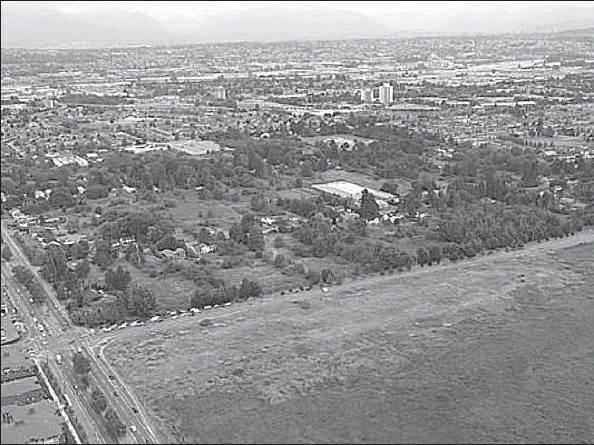The land reserve is more about preserving real estate value than ensuring we have things to eat
Steve Lornie
Sun

The Agricultural Land Reserve prevents land, such as this prime parcel of 55 hectares in Richmond, from being developed as housing, which drives up the cost of real estate in the Lower Mainland.
As governments and citizens of the world endeavour to find ways to lessen our carbon footprint on the planet, there is a tendency to blur the distinction between local food supply as a carbon reduction strategy and that of local supply as a food security issue.
And while there is robust and informed debate on all sides of the carbon reduction issue, food security often gets superficial, though impassioned, treatment, but the signficance of the issue certainly warrants its own informed analysis.
Thanks to reduced protectionism, efficient transport, and competitive markets, Canadians have never had better food choices at lower costs than we do today.
The fact that (to quote Peter Ladner from Business in Vancouver) “the world’s supply of available food has shrunk from a year’s supply a couple of decades ago to five weeks today” shows just how efficient and balanced our free-market system has become.
No longer do we put food in tin cans to sit in a grocer’s warehouse for a year, or rely on turnips moldering in the root cellar.
Instead we can buy fresh food in January, grown in a local greenhouse, or produced by a farmer in a warmer climate.
Like Toyota with their “just-in-time” inventory, we food consumers have enjoyed the benefits of modern cost-effective production and efficient low-cost delivery.
We must stop pretending that “food security” is achieved by growing our own food.
It is not.
Food security is achieved when societies such as ours become wealthy, and it eludes those which do not.
True food security requires free and open markets, accessible by both consumers and producers wherever they may be.
We must also stop confusing the concepts of food security with food safety.
There are only two things these subjects have in common: Both are used by the left to attack free markets, and neither one is a problem worthy of more than our passing attention.
Serious food safety issues are rare, and food security is a cover for other issues (such as protectionism, rent-seeking, land-use issues, etc.) completely unrelated to food.
Those who indulge in an obsessive focus on food security should not ignore the harm it causes others, especially the young and the poor in this country.
One of the most damaging of the food security arguments is the one that supports the Agricultural Land Reserve (ALR).
This 35-year old legislation has less to do with food security than it has to do with protecting high real estate values and controlling growth in semi-urban areas.
It is a sacred cow that has managed to avoid serious examination.
One can speculate that the popularity of the ALR is due to the fact that 70 per cent of voters in the Lower Mainland are homeowners whose homes have been artificially inflated by the ALR-caused land scarcity.
The other 30 per cent of our citizens (predominately made up of young couples, single-income families, and new arrivals) have been priced out of home ownership, in a large part directly due to the ALR.
True food security comes from having many producers around the world supplying our needs, not from an artificial propping-up of inefficient and non-competitive at-home production.
Don’t slam the door on the struggling farmers of the Third World.
Let them play a role in our food security.
Open access to free markets and free trade is what keeps our food costs low and our supplies secure, not subsidies, tariffs, marketing boards, and poorly thought out land-use restrictions.
Steve Lornie is president of Stonecroft Management, a Vancouver construction management company.
© Copyright (c) The Vancouver Sun
